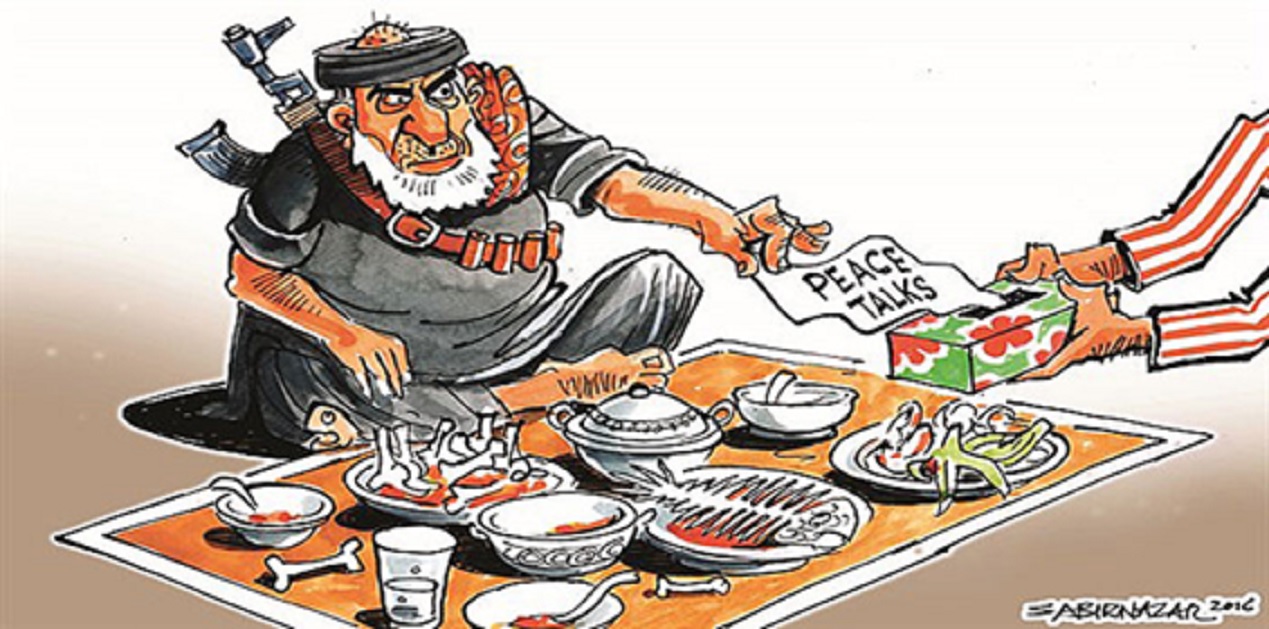After a decade and a half long rift between the Pakistan government and the Tehreek-e-Taliban Pakistan (TTP) and several failed peace treaties, the two sides again attempted an uneasy truce in June 2022 to prevent further bloodshed by having a "three month-long complete ceasefire", only to be breached in times to come.[1] This cessation of violence resulted after weeks of secret meetings between TTP and the Pakistan military in Kabul, mediated by the Afghan Taliban.[2] As part of the truce, Pakistan released four TTP leaders which included the most infamous Haji Muslim Khan, popularly known as the “butcher of Swat”, the former regional spokesperson for the group in Swat valley. Pakistan expected TTP militants to continue with negotiations to end the years-long conflict and thereby de-escalate the hostilities between the two sides.[3]
Certain clauses of the deal invited the predicted backlash from the opposition. Later, a press statement was issued by the National Security Committee (NSC) that the talks with TTP will be held to resolve the issues amicably and the decisions will be taken after consulting the parliament. However, what is surprising is the need for the constitution to be consulted on the issue of national security when the organisation in question is a listed as a “terrorist organisation”.
The TTP alone, excluding its secessionist and affiliated local groups, carried out approximately 3,280 terrorist attacks in Pakistan since its inception - including 301 suicide bombings. It resulted in around 7,488 fatalities and 15,086 injuries, according to statistics taken from the Pak Institute for Peace Studies' digital database on Conflict and Security.[4] The Shakai accord 2004, Sararogha accord 2005, Waziristan accord 2006, and the Nizam-e-Adl agreement in 2009 were some of the promising opportunities offered to the Pakistani Taliban in the past to put an end to hostilities, however, none of these agreements could be endured for very long. Experts contend that even if the government signs a peace agreement with the outlawed TTP, it may only offer a partial respite to the security institutions without any visible assurance of a durable peace in the region.[5]
In light of recent developments, evaluating the implications of the negotiation for peace between the Government and TTP is imperative. It is pertinent to analyse Pakistan’s agenda for engaging in negotiations with terrorist group and its objectives for the proposed agreement.
Geopolitical Setting
It can be logically argued that urgency with which Pakistan is calling for negotiation with the terrorist organisation is primarily aimed at securing its geoeconomic interests and geopolitical goals in a single shot. There are semingly good reasons why Pakistan would desire a friendly government in Kabul, at the risk of pardoning the TTP, who is the Afghan Taliban's Pakistani face. Since its goals have been acknowledged both tacitly and openly in official and unofficial declarations by decision-makers several times, Pakistan's cooperation with the Taliban government is not a secret any more. One of the primary goals of Pakistan's Afghan policy is to keep Afghanistan out of India’s influence, while strengthening its geoeconomic ties with China and the other Central Asian States to further its singular objective of increasing its dominance over the region. Apparently, Pakistan wishes to maintain its role as one of principal and natural allies of Afghanistan showcasing to the world that the Taliban government is under its influence.
Pakistan appears to have very high expectations of the Taliban government in Afghanistan. Also, the Talibani leadership inherently looks toward Pakistan for legitimacy as it sees little support coming from international community, which has triggerred a humanitarian and economic crisis in their country. On the hind sight, they haven't been willing to discuss how they plan to deal with Pakistan publicly. Mullah Yaqub, the all-powerful Defence Minister of the Taliban and the son of the Organisation's founder Mullah Omar, lately, had issued a warning that the Taliban would not put up with further incursions when Pakistan attempted several airstrikes in Afghanistan targeting the TTP leadership.[6]
Despite their antipathy, the Taliban administration cannot afford to ignore Pakistan because it is one of the few countries that can assist them in overcoming their diplomatic and economic challenges. [7] The continuing negotiations with the TTP give the Afghan Taliban government in Kabul a tremendous opportunity to demonstrate its readiness and capability to control foreign militants in Afghanistan. Regarding the Taliban's promises, the world remains openly sceptical. However, if the Taliban can assist Pakistan in neutralising the TTP, it might open the door for at least a few of Afghanistan's close neighbours to recognise their authority. The Taliban may gain the confidence of China, Russia, and the Central Asian nations by keeping their promises with regard to denying any support to the local militant groups.
Pakistan on the Back Foot
Amnesty and reconciliation with terror organisation are often confused with de-radicalisation by Pakistan's security institutions. Therefore, it could be risky to provide amnesty to hardcore militants who won't compromise on their radical ideology. By offering such pacts, firstly, the TTP could stage a come back heavily in Pakistan and re-capture the areas it had previously lost. Secondly, the group could reassert the application of its interpretation of Sharia with just a little assistance from the public. And finally, the Afghan Taliban could have a solid backing inside Pakistan which could be used against Islamabad in times to come.
TTP took advantage of the weak domestic policy and negotiated release of some of its most notorious militants including Muslim Khan. One of the reasons of the weak domestic policy is the choice of Pakistani representative for negotiation, General Faiz Hamid, Commander of the Peshawar Corps and the divide within the army over this choice. As in the past, Peshawar Corps failed to achieve any success in talks. Although the Army Chief always supported Gen Hamid, but he lacked the trust of ISI Chief Nadeem Anjum. [8] As a result, Pakistan was put on the back foot in negotiations.
Apart from domestic policy failures, most of these negotiations have happened from the position of government’s weakness, where in government offered a large sum of money as compensation, which was being siphoned for funding their terror operations, and thus militants have had their way most of the time. And every breach of truce lead to bouts of violence. This clearly shows that militants are more influential, and the Army and the Government have always been on the receiving end firming up the TTP position in the region.
What Next?
After several failed ceasefires since 2004 between Pakistan and TTP, the present truce has been short-lived and never really stood the test of time. TTP has continued to carry out punitive attacks against Pakistan security personnel and, without any significant loss of its own men. The milieu of breach of trust will persist unless Pakistan decides not to give in to the group's demands. It risks jeoparadising Pakistan's all previous achievements against counter-terrorism.[9]
Meanwhile, TTP has relentlessly been trying to sway public opinion in their favour by making statements in support of the Pashtun Tahafuz Movement (PTM) and the Tehreek-e-Labbaik Pakistan (TLP).[10] Further, TTP is known for its support and role as a facilitator for groups like Al Qaeda, the Taliban and the East Turkestan Islamic Movement (ETIM). Based on conversations with two Al Qaeda members, CNN asserted in April 2021, that, the organisation would increase its operations in the area following the US withdrawal from Afghanistan. According to another CNN report, the organisation intended to make a comeback by leaning on its coalition with the Taliban in Pakistan and Afghanistan.[11]
Given the new realities like a shambolic economy, volatile domestic politics and lack of international support, Pakistan must revisit the limitations of peace talks and not live in a fools' paradise of negotiating from the position of power. It could carry out military operations against the TTP, which will also help Pakistan's government gain confidence in the military. Or else, Pakistan must coerce the Taliban to help them beyond facilitating talks; simultaneously, Pakistan could probably try to garner some support from its citizens.
Endnotes :
[1]Umair Jamal, “Tehreek-e-Taliban Pakistan Declares Unilateral Ceasefire”, 13 June 2022, The Diplomat, https://thediplomat.com/2022/06/tehreek-e-taliban-pakistan-declares-unilateral-ceasefire/
[2]Naveed Hussain, “TTP Talks: Lasting Peace May Still be a Longshot”, 12 June 2022, Tribune, https://tribune.com.pk/story/2361085/ttp-talks-lasting-peace-may-still-be-a-longshot
[3]Ismail Khan, “Islamabad, TTP agree on indefinite Ceasefire”, 31 May 2022, Dawn,https://www.dawn.com/news/1692383/islamabad-ttp-agree-on-indefinite-ceasefire
[4]Muhammad Amir Rana, “Pakistan’s Peace Talks with TTP: Prospective outcome and implications”, Pakistan Institute for Peace Studies, July 20, 2022, https://www.pakpips.com/article/6959
[5]Ibid
[6]South Asia Monitor, “We won’t tolerate ‘invasions’, says Taliban defense minister to Pakistan; Kabul-Islamabad ties taut,” April 25, 2022, https://www.southasiamonitor.org/afghanistan/we-wont-tolerate-invasions-says-taliban-defense-minister-pakistan-kabul-islamabad-ties
[7]Naveed Hussain, “TTP Talks,” The Express Tribune, June 12, 2002, https://tribune.com.pk/story/2361085/ttp-talks-lasting-peace-may-still-be-a-longshot
[8]Asfandyar Mir, “Five things to watch in the Islamabad Pakistani Taliban Talk”, 21 June 2022, United States institute of Peace, https://www.usip.org/publications/2022/06/five-things-watch-islamabad-pakistani-taliban-talks
[9]Saima Shabbir, “Pessimism looms over outcome as Pakistan clears talks with local Taliban”, 7 July, 2022, Arab News, https://www.arabnews.com/node/2118436/world
[10]Abdul Sayed, “The Evolution and Future of Tehrik-e-Taliban”, December 21, 2021, Carnegie Endowment for International Peace, https://carnegieendowment.org/2021/12/21/evolution-and-future-of-tehrik-e-taliban-pakistan-pub-86051
[11]Nic Robertson, “Al Qaeda promises ‘war on all fronts’ against America as Biden pulls out of Afghanistan,” CNN, April 30, 2022, https://edition.cnn.com/2021/04/30/asia/al-qaeda-afghanistan-biden-intl-cmd/index.html
(The paper is the author’s individual scholastic articulation. The author certifies that the article/paper is original in content, unpublished and it has not been submitted for publication/web upload elsewhere, and that the facts and figures quoted are duly referenced, as needed, and are believed to be correct). (The paper does not necessarily represent the organisational stance... More >>
Image Source: https://www.irancartoon.com/site/media/zartists/f694cc9816d9fc991f638401c7c56be5/sabir_nazar_-_pakistan_11.jpg











Post new comment